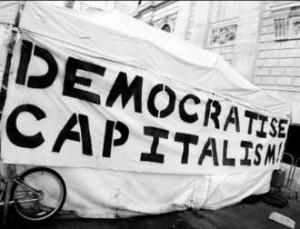 It’s cold in the Occupation Records office in a UBS-owned building on Sun Street, now occupied by the activities of Occupy London. I drag myself out of the warmth of my bed – a half deflated air mattress and a bundle of sleeping bags – and reach for my phone, whose ring has demanded I get up. On the other end of the line is Tom, who manages media for Ani DiFranco in Europe. I met with him at Ani’s show the night before while updating her on Occupy London. I’m meant to show her around the occupation this afternoon but its only 8 in the morning. I’m cold and sick and would rather still be wrapped in the comfort of my sleeping bags.
It’s cold in the Occupation Records office in a UBS-owned building on Sun Street, now occupied by the activities of Occupy London. I drag myself out of the warmth of my bed – a half deflated air mattress and a bundle of sleeping bags – and reach for my phone, whose ring has demanded I get up. On the other end of the line is Tom, who manages media for Ani DiFranco in Europe. I met with him at Ani’s show the night before while updating her on Occupy London. I’m meant to show her around the occupation this afternoon but its only 8 in the morning. I’m cold and sick and would rather still be wrapped in the comfort of my sleeping bags.
After sorting details with Tom I plop down at my desk and begin running through my inbox: an email from one of the artists working on a album cover, but the specs are wrong; another one informing me the land we were looking at for a music festival is too small. But then some good news with three more confirmations for tracks on the new benefit album.
Once emails are replied to I head down to St. Paul’s for a meeting with the rest of the 45 Revolutions Per Minute Collective. The autonomous collective of occupiers is made up of music industry, public relations, and marketing professionals, and we’re the crew behind Occupation Records. The label and the collective behind it have been set up to spread the message of Occupy to a broader audience and provide a sustainable funding source for the movement.
Part of spreading the message is in how we operate – organising the label to embody the values of Occupy. The label’s operation is very distinct from a traditional label. All key decisions for the label, from artwork on an album, to production budgets, are made by consensus – and each member of the eight-person collective is represented by a union.
In the spirit of the movement, it’s planned for all releases to be offered digitally on a pay-what-you-can basis where the customer sets the price. All profits go to support Occupy London, Occupy camps around the UK and Ireland, as well as the global Occupy movement.
I get to a pub near St Paul’s for the meeting. The last couple days have been incredibly busy for us and there’s a lot to update. We each go in turn. I handle artist and industry relations. A couple days before I’d met up with Sam Duckworth at his studio, Sam is a musician that has been incredibly supportive of the movement, getting involved especially with youth outreach. We discussed working together on the label and ideas for the next three albums. Press and marketing inform us of their meeting with some sympathetic PR firms and a company specialising in mobile apps that would like to support us, as well as a meeting with another artist, well known for album covers he’s designed.
The Webmaster discusses possibilities for the distribution platform and a member from live production updates the collective on progress for the first album release gig. Finally, the member handling administration shows us their progress and creating a “how-to” guide to the independent collective model we use to operate.
There are so many talented and skilled individuals in the Occupy movement. Artists, authors, organisers, professionals, in so on. Due to the corporate take over of industries that traditionally aligned with and supported radical and progressive movements, many of these individuals may feel shut out of their chosen field or simply not want to deal with the soulless nature some of the industries have taken on.
Within the space created by Occupy these individuals can operate in support of the movement outside the arbitrary requirements of the corporate world. Many artistic industries are ripe to be subverted. Considering the inspirational impact of V for Vendetta, The X-Men, and new developments with iconic superheroes (Captain America having been assassinated by the CIA for leading a rebellion against the government, Superman having renounced his US citizenship) a collective formed around the distribution of radical comics and graphic novels could spread the message of Occupy to a younger audience while supporting the movement.
Publishing collectives, design collectives, performance collectives – there are many possibilities out there. They provide a way to sustain the movement, further legitimising Occupy as an alternative, and providing new outlets for our message.
As we wrap up our meeting I get a text from Ani’s manager telling me they’re on site. We head down to the info tent to meet up with her, her manager, and her tour manager – all fantastic people. As she walks around site I walk with her manager and watch the interactions with fellow occupiers. A little later she straps on her guitar and plays a few tunes – but the most poignant moment for me is when she takes a seat in the audience to listen to a poem by Venus. It’s then that I remember how much I loved working in the industry. And how much more I love making it work for Occupy.
By Adam Jung




